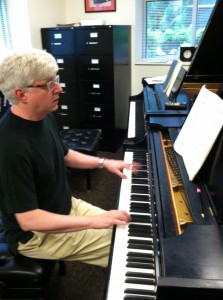Back when he was in fifth grade, Dr. Jerome Reed didn’t know he was going to become a globe-trotting “therapist for the human soul” with his piano talent. He did, however, know he was going to teach at Lipscomb.
He told the president as much.
Reed said when he was a child, Willard Collins, Lipscomb’s president at the time, used to speak at Reed’s church in Columbia, Tenn., on the first Sunday of each year. In fifth grade, Reed approached Collins and announced that he would one day be a professor at Lipscomb.
Now after 30 years on campus, Reed, the Patricia and Rodes Hart professor of piano, said he couldn’t be more fortunate.
“I think I have the best job in the universe,” Reed said, “because I do something every day that I love so much, I would be glad to do it even if I weren’t paid to do it. It’s really a fabulous job.”
Reed, also the director of the music division of the Governor’s School for the Arts, has performed across the U.S., Europe and South America. At least 54 times, Charles Ives’ Concord Sonata has been the featured piece.
According to Reed, Ives’ Concord Sonata is a musical depiction of some of the authors who lived in Concord, Mass.—Bronson and Louisa May Alcott, Nathaniel Hawthorne, Ralph Waldo Emerson and Henry David Thoreau.
For almost a year, Reed spent time creating a PowerPoint presentation that would play during his performances of the nearly hour-long piece. The presentation includes Reed’s photos of the authors’ houses and scenery in Concord along with quotations from the authors.
“I put together this PowerPoint because that piece is really thorny to listen to unless you’ve got something to follow along with,” Reed explained, noting that the quotations in the slideshow were translated into six languages for performances he did in Europe and Asia.
Reed spent a semester in Vienna for Lipscomb’s study abroad program and has traveled extensively. He said staying with people you know really changes the traveling experience.
“It’s very different visiting a country when you are visiting dear friends in that country,” he said. “I’ve had that experience in England, France, Germany, Belgium, Hungary and Japan. Situations where you’re actually going into people’s homes and having meals in their homes, that kind of thing makes traveling very, very different.”

Reed, who sometimes goes by Jerry, said he prefers to be called Jerome in print to avoid confusion with Jerry Reed, a beloved country music star, actor and guitar innovator who died in 2008.
Reed said he and the other Jerry Reed used to have the same dry cleaner and same travel agent. Once, a group of people wearing cowboy hats walked in to the professor’s piano recital, expecting to see the country musician.
“To their credit, at least they stayed through the first piece, which was nearly 20 minutes long,” Reed said.
Reed said the best advice he knows, and the advice he shares with his students, is this: “Choose something that you love to do, learn to do that very well, then figure out how to make a living doing that.”
Reed said a new piece of advice he’s discovered comes from the Boston Conservatory and a speech that Karl Paulnack, director of the school’s music division, gives to incoming students. Reed said the speech addresses a misconception that he deals with occasionally—a feeling that what he does as a musician isn’t essential to society.
“If we were a medical school, and you were here as a med student practicing appendectomies, you’d take your work very seriously because you would imagine that some night at 2 a.m. someone is going to waltz into your emergency room and you’re going to have to save their life. Well, my friends, someday at 8 p.m. someone is going to walk into your concert hall and bring you a mind that is confused, a heart that is overwhelmed, a soul that is weary. Whether they go out whole again will depend partly on how well you do your craft.
“You’re not here to become an entertainer, and you don’t have to sell yourself. The truth is you don’t have anything to sell; being a musician isn’t about dispensing a product, like selling used cars. I’m not an entertainer; I’m a lot closer to a paramedic, a firefighter, a rescue worker. You’re here to become a sort of therapist for the human soul, a spiritual version of a chiropractor, physical therapist, someone who works with our insides to see if they get things to line up, to see if we can come into harmony with ourselves and be healthy and happy and well.”

